- Joined
- Oct 9, 2007
- Messages
- 47,290 (7.53/day)
- Location
- Hyderabad, India
| System Name | RBMK-1000 |
|---|---|
| Processor | AMD Ryzen 7 5700G |
| Motherboard | ASUS ROG Strix B450-E Gaming |
| Cooling | DeepCool Gammax L240 V2 |
| Memory | 2x 8GB G.Skill Sniper X |
| Video Card(s) | Palit GeForce RTX 2080 SUPER GameRock |
| Storage | Western Digital Black NVMe 512GB |
| Display(s) | BenQ 1440p 60 Hz 27-inch |
| Case | Corsair Carbide 100R |
| Audio Device(s) | ASUS SupremeFX S1220A |
| Power Supply | Cooler Master MWE Gold 650W |
| Mouse | ASUS ROG Strix Impact |
| Keyboard | Gamdias Hermes E2 |
| Software | Windows 11 Pro |
AMD today announced its 3rd generation EPYC (7003 series) enterprise processors, codenamed "Milan." These processors combine up to 64 of the company's latest "Zen 3" CPU cores, with an updated I/O controller die, and promise significant performance uplifts and new security capabilities over the previous generation EPYC 7002 "Rome." The "Zen 3" CPU cores, AMD claims, introduce an IPC uplift of up to 19% over the previous generation, which when combined by generational increases in CPU clock speeds, bring about significant single-threaded performance increases. The processor also comes with large multi-threaded performance gains thanks to a redesigned CCD.
The new "Zen 3" CPU complex die (CCD) comes with a radical redesign in the arrangement of CPU cores, putting all eight CPU cores of the CCD in a single CCX, sharing a large 32 MB L3 cache. This the total amount of L3 cache addressable by a CPU core, and significantly reduces latencies for multi-threaded workloads. The "Milan" multi-chip module has up to eight such CCDs talking to a centralized server I/O controller die (sIOD) over the Infinity Fabric interconnect.
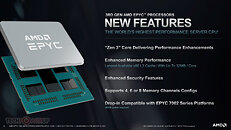
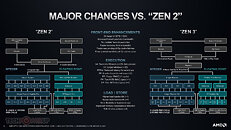
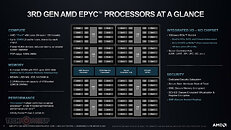
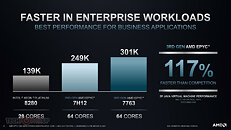
The I/O capabilities of the new sIOD are largely unchanged from the previous gen—128 PCI-Express 4.0 lanes, and 8-channel DDR4 memory—however, AMD has updated the memory controllers to support 6-channel memory interleaving, besides 4-channel and 8-channel. The Security Processor located in the sIOD has also been updated to enable newer forms of secure virtualization, including Secure Nested Paging, a technology that prevents a rogue/compromised hyepervisor from gaining access to the secure memory of a guest VM. AMD also introduced hardware-level hardening against a broad spectrum of control-flow attacks.
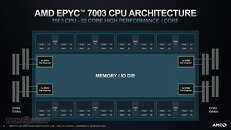
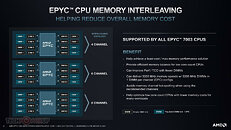
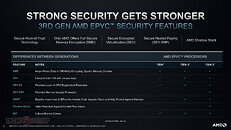
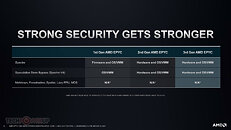
AMD's product stack for the EPYC 7003 series includes 64-core, 56-core, 48-core, 32-core, 28-core, 24-core, 16-core, and 8-core models. There are multiple models based on the same core-counts, but different in the arrangement of the cores. A 32-core processor can be made using four maxed out 8-core CCDs, or eight CCDs with 4 cores enabled, each. Here, the latter configuration would squeeze out more performance, as each CPU core competes with other cores on its CCD for more L3 cache. With Intel's next-gen "Ice Lake-SP" Xeon Scalable processor still unreleased, AMD claims an over 2.0x performance lead over the current Xeon Scalable "Cascade Lake-SP" processors.
In the below table, you'll find the individual EPYC 7003 series SKUs, their specifications, and SEP pricing.
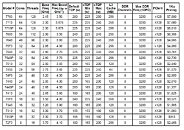
The announcement press-release follows.
At a digital event, AMD (NASDAQ: AMD) announced the new AMD EPYC 7003 Series CPUs, which includes the AMD EPYC 7763, the world's highest-performing server processor. The new EPYC 7003 series processors help HPC, cloud and enterprise customers do more, faster, by delivering the best performance of any server CPU with up to 19% more instructions per clock.
"With the launch of our 3rd Gen AMD EPYC processors, we are incredibly excited to deliver the fastest server CPU in the world. These processors extend our data center leadership and help customers solve today's most complex IT challenges, while substantially growing our ecosystem," said Forrest Norrod, senior vice president and general manager, Data Center and Embedded Solutions Business Group. "We not only double the performance over the competition in HPC, cloud and enterprise workloads with our newest server CPUs, but together with the AMD Instinct GPUs, we are breaking the exascale barrier in supercomputing and helping to tackle problems that have previously been beyond humanity's reach."
AMD EPYC Processors, Powering the Modern Data Center
Available immediately, AMD EPYC 7003 Series Processors have up to 64 "Zen 3" cores per processor and introduce new levels of per-core cache memory, while continuing to offer the PCIe 4 connectivity and class-leading memory bandwidth that defined the EPYC 7002 series CPUs. 3rd Gen AMD EPYC processors also include modern security features through AMD Infinity Guard, supporting a new feature called Secure Encrypted Virtualization-Secure Nested Paging (SEV-SNP). SEV-SNP expands the existing SEV features on EPYC processors, adding strong memory integrity protection capabilities to help prevent malicious hypervisor-based attacks by creating an isolated execution environment. You can read more about new 3rd Gen AMD EPYC features here.
All these features and capabilities combine to help drive faster time to results and improve business outcomes for HPC, cloud and enterprise customers.
The AMD EPYC processor ecosystem is expected to grow significantly by the end of 2021 with more than 400 cloud instances using all generations of EPYC processors and 100 new server platforms using 3rd Gen EPYC processors. AMD EPYC 7003 Series processor-based solutions are available now through numerous OEMs, ODMs, cloud providers and channel partners around the world.
The complete slide-deck follows.



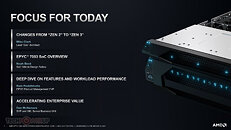
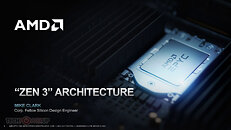
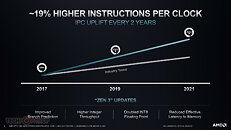
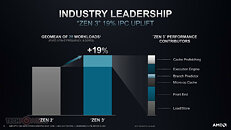
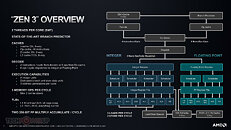

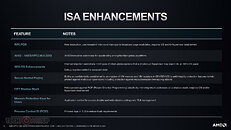

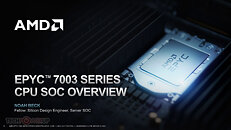


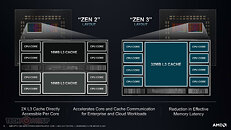
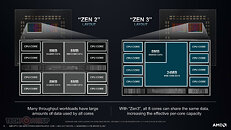


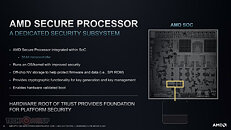


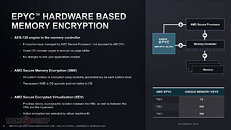
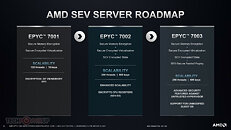
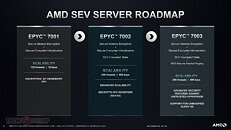
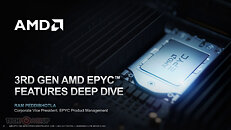
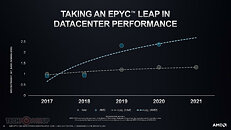
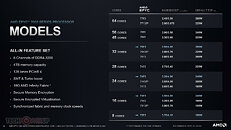
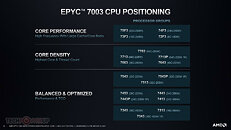
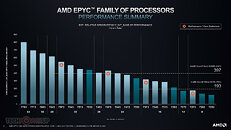
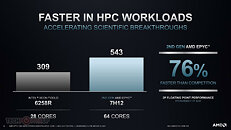
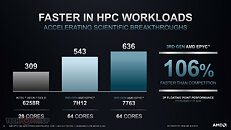
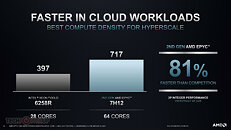
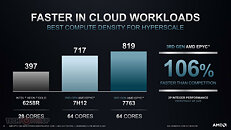
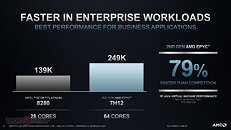

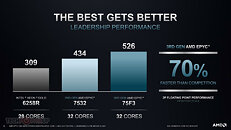
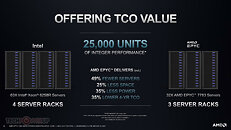
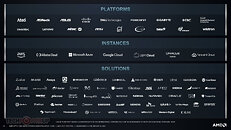
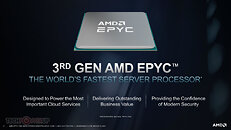



View at TechPowerUp Main Site
The new "Zen 3" CPU complex die (CCD) comes with a radical redesign in the arrangement of CPU cores, putting all eight CPU cores of the CCD in a single CCX, sharing a large 32 MB L3 cache. This the total amount of L3 cache addressable by a CPU core, and significantly reduces latencies for multi-threaded workloads. The "Milan" multi-chip module has up to eight such CCDs talking to a centralized server I/O controller die (sIOD) over the Infinity Fabric interconnect.




The I/O capabilities of the new sIOD are largely unchanged from the previous gen—128 PCI-Express 4.0 lanes, and 8-channel DDR4 memory—however, AMD has updated the memory controllers to support 6-channel memory interleaving, besides 4-channel and 8-channel. The Security Processor located in the sIOD has also been updated to enable newer forms of secure virtualization, including Secure Nested Paging, a technology that prevents a rogue/compromised hyepervisor from gaining access to the secure memory of a guest VM. AMD also introduced hardware-level hardening against a broad spectrum of control-flow attacks.




AMD's product stack for the EPYC 7003 series includes 64-core, 56-core, 48-core, 32-core, 28-core, 24-core, 16-core, and 8-core models. There are multiple models based on the same core-counts, but different in the arrangement of the cores. A 32-core processor can be made using four maxed out 8-core CCDs, or eight CCDs with 4 cores enabled, each. Here, the latter configuration would squeeze out more performance, as each CPU core competes with other cores on its CCD for more L3 cache. With Intel's next-gen "Ice Lake-SP" Xeon Scalable processor still unreleased, AMD claims an over 2.0x performance lead over the current Xeon Scalable "Cascade Lake-SP" processors.
In the below table, you'll find the individual EPYC 7003 series SKUs, their specifications, and SEP pricing.

The announcement press-release follows.
At a digital event, AMD (NASDAQ: AMD) announced the new AMD EPYC 7003 Series CPUs, which includes the AMD EPYC 7763, the world's highest-performing server processor. The new EPYC 7003 series processors help HPC, cloud and enterprise customers do more, faster, by delivering the best performance of any server CPU with up to 19% more instructions per clock.
"With the launch of our 3rd Gen AMD EPYC processors, we are incredibly excited to deliver the fastest server CPU in the world. These processors extend our data center leadership and help customers solve today's most complex IT challenges, while substantially growing our ecosystem," said Forrest Norrod, senior vice president and general manager, Data Center and Embedded Solutions Business Group. "We not only double the performance over the competition in HPC, cloud and enterprise workloads with our newest server CPUs, but together with the AMD Instinct GPUs, we are breaking the exascale barrier in supercomputing and helping to tackle problems that have previously been beyond humanity's reach."
AMD EPYC Processors, Powering the Modern Data Center
Available immediately, AMD EPYC 7003 Series Processors have up to 64 "Zen 3" cores per processor and introduce new levels of per-core cache memory, while continuing to offer the PCIe 4 connectivity and class-leading memory bandwidth that defined the EPYC 7002 series CPUs. 3rd Gen AMD EPYC processors also include modern security features through AMD Infinity Guard, supporting a new feature called Secure Encrypted Virtualization-Secure Nested Paging (SEV-SNP). SEV-SNP expands the existing SEV features on EPYC processors, adding strong memory integrity protection capabilities to help prevent malicious hypervisor-based attacks by creating an isolated execution environment. You can read more about new 3rd Gen AMD EPYC features here.
All these features and capabilities combine to help drive faster time to results and improve business outcomes for HPC, cloud and enterprise customers.
- For HPC customers that demand the most throughput computing capabilities to do more simulations in a given time period, or use bigger data sets or more complex models, AMD EPYC 7003 Series processors enable faster time to discovery with more I/O and memory throughput, and powerful "Zen 3" cores that deliver up to twice the performance for HPC workloads compared to the competition.
- For cloud providers who need compute density and security capabilities, AMD EPYC 7003 Series processors offer the highest core density, advanced security features and up to twice the integer performance compared to the competition.
- For the enterprise, where performance and time to value are critical to support the new "work from anywhere" environment, AMD EPYC 7003 Series processors help improve efficiency, and deliver value and performance. The new processors increase transactional database processing by up to 19%9, improve Hadoop big data analytic sorts by up to 60% with 61% better price to performance than the competition, and offer superior performance for flexible Hyperconverged Infrastructure - all of which help CIOs turn data into actionable insights faster.
The AMD EPYC processor ecosystem is expected to grow significantly by the end of 2021 with more than 400 cloud instances using all generations of EPYC processors and 100 new server platforms using 3rd Gen EPYC processors. AMD EPYC 7003 Series processor-based solutions are available now through numerous OEMs, ODMs, cloud providers and channel partners around the world.
- AWS - will add the AMD EPYC 7003 series processors to its core Amazon EC2 instance families later this year.
- Cisco - introduced new Cisco Unified Computing System (Cisco UCS ) rack server models with AMD EPYC 7003 Series Processors designed to support modern hybrid cloud workloads.
- Dell Technologies - announced the all new PowerEdge XE8545 server with AMD EPYC 7003 series CPUs, and the company will support the new processors within its PowerEdge server portfolio.
- Google Cloud - announced AMD EPYC 7003 series processors will power a new compute optimized VM, C2D, and an expansion of the existing general purpose N2D VM later this year. Google Cloud Confidential Computing will be available on both C2D and N2D.
- HPE - announced it will double the lineup of AMD EPYC processor powered solutions, using the AMD EPYC 7003 series processors in new HPE ProLiant servers, HPE Apollo systems and HPE Cray EX supercomputers.
- Lenovo - added ten Lenovo ThinkSystem Servers and ThinkAgile HCI solutions built on 3rd Gen EPYC processors, and achieved more than 25 new world records across a broad set of industry-standard benchmarks in workload areas.
- Microsoft Azure - announced multiple new virtual machine offerings powered by AMD EPYC 7003 series processors. Azure HBv3 virtual machines for HPC applications are generally available today, and Confidential Computing virtual machines that utilize the full security features of the new AMD EPYC 7003 series processors are in private preview.
- Oracle Cloud Infrastructure - announced it is extending its flexible virtual machine and bare metal compute offerings with the new E4 platform based on 3rd Generation AMD EPYC Processors.
- Supermicro - introduced the AMD EPYC 7003 series processor in its Supermicro A+ single and dual socket family of Ultra, Twin, SuperBlade, Storage and GPU Optimized Systems.
- Tencent Cloud - announced the new Tencent Cloud SA3 server instance, powered by the 3rd Gen AMD EPYC processors.
- VMware - announced its latest release of VMware vSphere 7 which is optimized to take advantage of AMD EPYC processors virtualization performance, while supporting the processors' advanced security features, including SEV-ES for both virtual machine based and containerized applications.
The complete slide-deck follows.










































View at TechPowerUp Main Site






